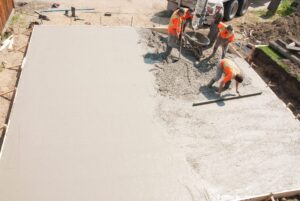How many types of concrete are used for construction?

How Many Types of Concrete Are Used for Construction?
Commercial Concrete Services in Texas and Louisiana
To the untrained eye, it may seem as though all concrete is the same. Concrete tends to look fairly uniform, and it’s often used for similar purposes. But in actuality, there are many different types of concrete, each of which is best suited for specific applications. If you’re planning a construction project that will require concrete, it’s important to know which type of concrete is right for your needs. Our expert concrete contractors at Ashton Sawing and Drilling LLC explain how many types of concrete are used for construction, how they each differ from each other, and how we can help you choose the right fit for your project.
What Is Concrete?
In general, concrete is a mixture of water, cement, and aggregate. The water is used to hydrate the cement, which forms a paste that binds the aggregate together. The type of aggregate used will vary depending on the application, but it’s typically made up of gravel, sand, or crushed stone.
Different types of concrete will have different ratios of these ingredients, as well as different proportions of water to cement. The ratio of water to cement is important, as too much water will make the concrete weaker, while too little water will make it difficult to work with. When working with concrete, it’s essential to hire knowledgeable concrete drilling contractors who have experience with the medium.
Types of Concrete
Plain concrete: Plain concrete is the most basic type of concrete. It’s made with a 1:2:4 ratio of cement, sand, and gravel, and it can be used for a variety of applications. It is often used to create pavement. Plain concrete is usually best for light to medium construction.
Lightweight concrete: Lightweight concrete is made with a variety of lightweight aggregates, such as pumice, scoria, foamed slag, or clay. It has a lower density than traditional concrete, which makes it ideal for applications where weight is a concern, such as in roofing or precast products.
High-density concrete: High-density concrete is made with a heavier aggregate, such as barite, limestone, or magnetite. Because of its extremely high density, it is often used for radiation shielding in facilities like power plants.
Precast concrete: Precast concrete is concrete that is cast into a mold and allowed to cure in the mold. It’s then transported to the construction site and used in place. Precast concrete is often used for architectural elements like beams, columns, or panels.
Prestressed concrete: Prestressed concrete is concrete that has been placed under compression before it is used in construction. This type of concrete is often used for beams, slabs, and foundations.
Glass concrete: Glass concrete is made with finely ground glass as the aggregate. It’s often used for decorative applications, such as countertops or flooring, due to its shiny and colorful appearance.
Asphalt concrete: Asphalt concrete is made with asphalt as the binder, rather than cement. It’s often used for paving roads or driveways.
Limecrete: Limecrete is made with lime as the binder, rather than cement. It’s a much weaker type of concrete, but it has a lower carbon footprint than traditional concrete.
Contact Us for Concrete Services
Ashton Sawing and Drilling LLC offers commercial concrete services throughout Texas and Louisiana. We specialize in concrete polishing, sawing, drilling, and more. If you’re planning a construction project that will require concrete, our expert contractors can help you choose the right type of concrete for your needs and ensure it is installed correctly. Contact us today to get started.
